Introduction
An Invitation to More
If you asked me if I was always comfortable in my body (and required that I answer honestly), I would have to say, No... No, Im not. Im of the opinion that there isnt anyone alive who is at home in his or her body 100 percent of the time, and I dont believe that I formed this opinion just to justify my own neuroses. If youd like to test this (and some of you will), I would suggest that you place your hand on the shoulder of the person nearest you for ten seconds. Just reach out and lay your hand on them lightly, and hold it there. You can count to ten if you want. Not only will this make them wildly uncomfortable, youll probably want to get out of your chair and run as far as you can from them.
And yet, if you actually did what I suggested, all youve done is put your hand on the shoulder of another person. It may have been your spouse, your child, your friend or, if youre amazingly brave, the stranger next to you at the coffee shop where youre reading this book. You initiated physical contact and connected with another human being using your body. You acknowledged your existence, you acknowledged their existence and you acknowledged the connection between the two of you. And, most likely, the vulnerability that brought up in you was unsettling. (More than unsettling if the stranger consequently slugged you.)
Today, Im a pale-skinned, freckled woman with blue eyes. I dont look in the mirror every morning and think that Im lovely; in fact, the moments that I feel most lovely are moments when Im not looking in the mirror at all.  Consciously contemplating my physical exterior isnt something I do very often, unless Im applying makeup or noticing that I probably need a haircut. But, unconsciously, I do it every day, squinting at myself when Im brushing my teeth, noticing another fold or crease of skin that indicates Ive gained a little more weight when I pass by the mirror on the way to the shower, picking at my fingernails and judging the length and symmetry of my fingers as I wait for dinner to be ready at a restaurant. These are not my finest moments. I would like to fool myself into thinking that these are the moments when I am most cognizant of my embodiment, the fact that it is my very essence, my very self that Im squinting at, criticizing or judging. But, mostly, theyre not.
Consciously contemplating my physical exterior isnt something I do very often, unless Im applying makeup or noticing that I probably need a haircut. But, unconsciously, I do it every day, squinting at myself when Im brushing my teeth, noticing another fold or crease of skin that indicates Ive gained a little more weight when I pass by the mirror on the way to the shower, picking at my fingernails and judging the length and symmetry of my fingers as I wait for dinner to be ready at a restaurant. These are not my finest moments. I would like to fool myself into thinking that these are the moments when I am most cognizant of my embodiment, the fact that it is my very essence, my very self that Im squinting at, criticizing or judging. But, mostly, theyre not.
Mostly those moments are when Im objectifying myself in order to distance myself from the pain of not measuring up to some standard I internalized at an age too young, because of a voice or voices that told me my body was inadequate, and in order to protect myself from being a disappointment at the very core of who I am, I began to think of me as something or someone separate from the physical body that walks, talks, breathes and sweats.
As a result, the moments when I feel most lovely, most true, most whole are those moments when I dont have a mirror in front of me, when Im not confronted with the physical reality of being human. I should like to think that this is a good thing, just as I should like to think that Im most aware of my embodiment when Im looking at myself, even if Im gazing with cruel eyes. Sometimes it is a good thingIm holding a child in my lap; being held in my husbands arms; taking the Eucharist into my mouth, chewing and swallowing; or covered with oil splatters, cornmeal and spices as I prepare a meal. In those moments, Im integratedall the parts of me are working together and Im present to them all. Nothing is cut out, nothing is despised, nothing is peripheral to my experience.
On the flip side of that, when Im lost in thought at a coffee shop, unaware of the mug of tea in my hands, or when Im caught in a good book, so disconnected from the physical object in my hands that my husband needs to literally take it from me in order to get my attentionthose are times when Im fragmented, gone astray and in need of being found by the One who is about bringing every part of us together into a whole. This whole is me, the me as I was originally designed, envisioned in the eyes of God. Its also the whole of a part, a functioning vital part, of the body of Christ. This larger whole needs me to be whole in order for the entire body to function, to be complete and healthy. The body of Christ needs me to be integrated with my body so that we may experience redemption together  , not just as individuals but as a people, a colony of heaven here on earth.
, not just as individuals but as a people, a colony of heaven here on earth.
Welcome to the Mess
Bodies are messy. They secrete, they bruise, they are fragile and unpredictable. Bodies are strong. They climb, run, grow and exert. Bodies are pliable. They shrink and expand, they adapt to parts being lost; bodies heal parts that have been hurt. Bodies do glorious things and bodies do unspeakably horrible things. 
I know, for the most part, I would rather tell other people what to do with their bodies than deal with the crazy mess that is my relationship with my own flesh and blood, my embodied soul. I would rather talk about the fractured way the world and the church relate to the material were made of than really wrestle with the way I fracture and fall apart when forced to deal with the stuff of myself.
I come by that naturallywe all do, because its a physiological fact that we dont perceive our own bodies the same way other people see them.
Body schema is the term scientists and doctors use to define our physical sense of ourselves. This is different than body image, which involves all the narratives we believe about our bodies based on the cultures and stories were surrounded with. Our body schema is based on both visual input (the way we see parts of ourselves) and neural-motor input (the amount of sense preceptors we have in parts of our body and the way our bodies move in the world). More recently, researchers have discovered that we also take body schema cues from interpersonal input (the way other people move their bodies changes how we perceive ours, especially when were children).


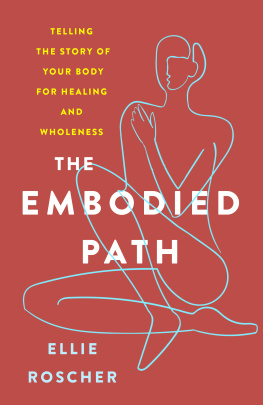
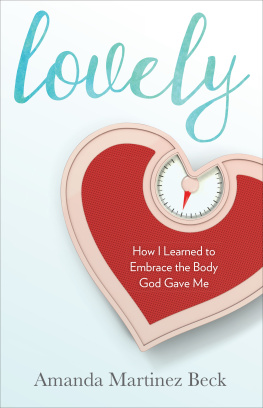
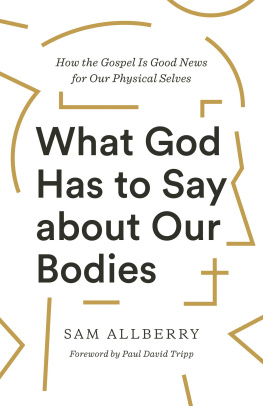
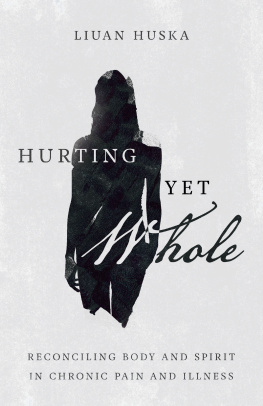
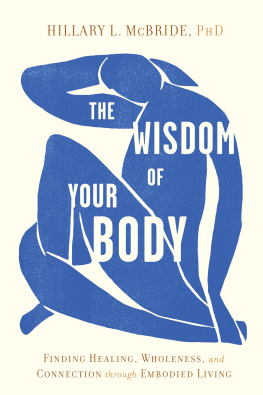
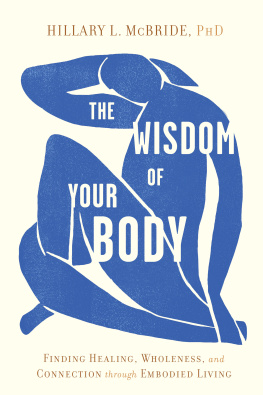

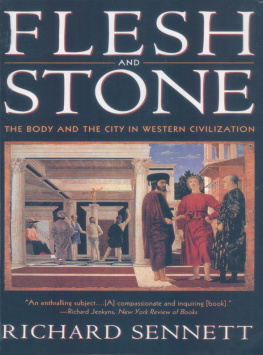

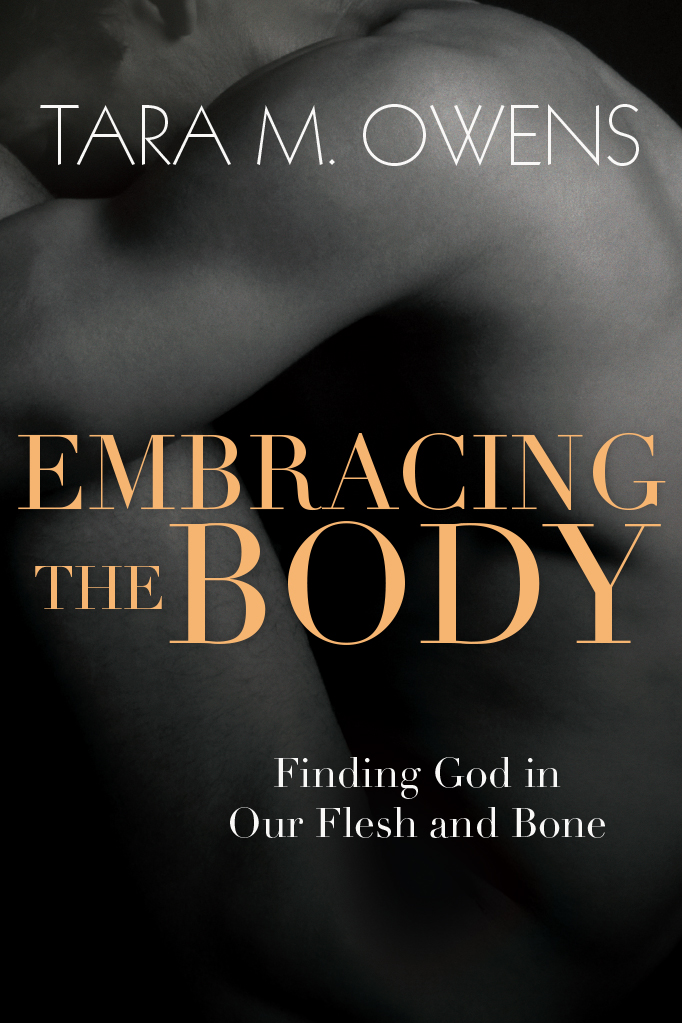
 Consciously contemplating my physical exterior isnt something I do very often, unless Im applying makeup or noticing that I probably need a haircut. But, unconsciously, I do it every day, squinting at myself when Im brushing my teeth, noticing another fold or crease of skin that indicates Ive gained a little more weight when I pass by the mirror on the way to the shower, picking at my fingernails and judging the length and symmetry of my fingers as I wait for dinner to be ready at a restaurant. These are not my finest moments. I would like to fool myself into thinking that these are the moments when I am most cognizant of my embodiment, the fact that it is my very essence, my very self that Im squinting at, criticizing or judging. But, mostly, theyre not.
Consciously contemplating my physical exterior isnt something I do very often, unless Im applying makeup or noticing that I probably need a haircut. But, unconsciously, I do it every day, squinting at myself when Im brushing my teeth, noticing another fold or crease of skin that indicates Ive gained a little more weight when I pass by the mirror on the way to the shower, picking at my fingernails and judging the length and symmetry of my fingers as I wait for dinner to be ready at a restaurant. These are not my finest moments. I would like to fool myself into thinking that these are the moments when I am most cognizant of my embodiment, the fact that it is my very essence, my very self that Im squinting at, criticizing or judging. But, mostly, theyre not.